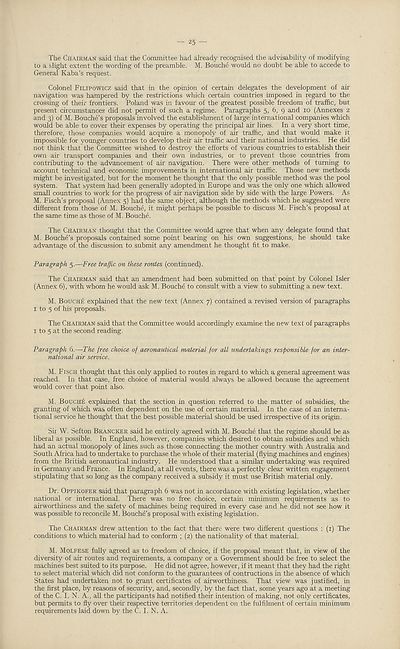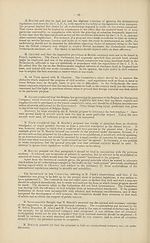Communications and transit > Air transport co-operation committee : minutes of the first session : held at Geneva from July 8th to 12th, 1930
(25)
Download files
Complete book:
Individual page:
Thumbnail gallery: Grid view | List view

25 —
The Chairman said that the Committee had already recognised the advisability of modifying
to a slight extent the wording of the preamble. M. Bouche would no doubt be able to accede to
General Kaba’s request.
Colonel Filipowicz said that in the opinion of certain delegates the development of air
navigation was hampered by the restrictions which certain countries imposed in regard to the
crossing of their frontiers. Poland was in favour of the greatest possible freedom of traffic, but
present circumstances did not permit of such a regime. Paragraphs 5, 6, 9 and 10 (Annexes 2
and 3) of M. Bouche’s proposals involved the establishment of large international companies which
would be able to cover their expenses by operating the principal air lines. In a very short time,
therefore, those companies would acquire a monopoly of air traffic, and that would make it
impossible for vounger countries to develop their air traffic and their national industries. He did
not think that the Committee wished to destroy the efforts of various countries to establish their
own air transport companies and their own industries, or to prevent those countries from
contributing to the advancement of air navigation. There were other methods of turning to
account technical and economic improvements in international air traffic. Those new methods
might be investigated, but for the moment he thought that the only possible method was the pool
system. That system had been generally adopted in Europe and was the only one which allowed
small countries to work for the progress of air navigation side by side with the large Powers. As
M. Fisch’s proposal (Annex 5) had the same object, although the methods which he suggested were
different from those of M. Bouche, it might perhaps be possible to discuss M. Fisch’s proposal at
the same time as those of M. Bouche.
The Chairman thought that the Committee would agree that when any delegate found that
M. Bouche’s proposals contained some point bearing on his own suggestions, he should take
advantage of the discussion to submit any amendment he thought fit to make.
Paragraph 5.—Free traffic on these routes (continued).
The Chairman said that an amendment had been submitted on that point by Colonel Isler
(Annex 6), with whom he would ask M. Bouche to consult with a view to submitting a new text.
M. Bouche explained that the new text (Annex 7) contained a revised version of paragraphs
1 to 5 of his proposals.
The Chairman said that the Committee would accordingly examine the new text of paragraphs
1 to 5 at the second reading.
Paragraph 6.—The free choice of aeronautical material for all undertakings responsible for an inter¬
national air service.
M. Fisch thought that this only applied to routes in regard to which a general agreement was
reached. In that case, free choice of material would always be allowed because the agreement
would cover that point also.
M. Bouche explained that the section in question referred to the matter of subsidies, the
granting of which was often dependent on the use of certain material. In the case of an interna¬
tional service he thought that the best possible material should be used irrespective of its origin.
Sir W. Sefton Brancker said he entirely agreed with M. Bouche that the regime should be as
liberal as possible. In England, however, companies which desired to obtain subsidies and which
had an actual monopoly of lines such as those connecting the mother country with Australia and
South Africa had to undertake to purchase the whole of their material (flying machines and engines)
from the British aeronautical industry. He understood that a similar undertaking was required
in Germany and France. In England, at all events, there was a perfectly clear written engagement
stipulating that so long as the company received a subsidy it must use British material only.
Dr. Oppikofer said that paragraph 6 was not in accordance with existing legislation, whether
national or international. There was no free choice, certain minimum requirements as to
airworthiness and the safety of machines being required in every case and he did not see how it
was possible to reconcile M. Bouche’s proposal with existing legislation.
The Chairman drew attention to the fact that there were two different questions : (1) The
conditions to which material had to conform ; (2) the nationality of that material.
M. Molfese fully agreed as to freedom of choice, if the proposal meant that, in view of the
diversity of air routes and requirements, a company or a Government should be free to select the
machines best suited to its purpose. He did not agree, however, if it meant that they had the right
to select material which did not conform to the guarantees of contructions in the absence of which
States had undertaken not to grant certificates of airworthiness. That view was justified, in
the first place, by reasons of security, and, secondly, by the fact that, some years ago at a meeting
of the C. I. N. A., all the participants had notified their intention of making, not only certificates,
but permits to fly over their respective territories dependent on the fulfilment of certain minimum
requirements laid down by the C. I. N. A.
The Chairman said that the Committee had already recognised the advisability of modifying
to a slight extent the wording of the preamble. M. Bouche would no doubt be able to accede to
General Kaba’s request.
Colonel Filipowicz said that in the opinion of certain delegates the development of air
navigation was hampered by the restrictions which certain countries imposed in regard to the
crossing of their frontiers. Poland was in favour of the greatest possible freedom of traffic, but
present circumstances did not permit of such a regime. Paragraphs 5, 6, 9 and 10 (Annexes 2
and 3) of M. Bouche’s proposals involved the establishment of large international companies which
would be able to cover their expenses by operating the principal air lines. In a very short time,
therefore, those companies would acquire a monopoly of air traffic, and that would make it
impossible for vounger countries to develop their air traffic and their national industries. He did
not think that the Committee wished to destroy the efforts of various countries to establish their
own air transport companies and their own industries, or to prevent those countries from
contributing to the advancement of air navigation. There were other methods of turning to
account technical and economic improvements in international air traffic. Those new methods
might be investigated, but for the moment he thought that the only possible method was the pool
system. That system had been generally adopted in Europe and was the only one which allowed
small countries to work for the progress of air navigation side by side with the large Powers. As
M. Fisch’s proposal (Annex 5) had the same object, although the methods which he suggested were
different from those of M. Bouche, it might perhaps be possible to discuss M. Fisch’s proposal at
the same time as those of M. Bouche.
The Chairman thought that the Committee would agree that when any delegate found that
M. Bouche’s proposals contained some point bearing on his own suggestions, he should take
advantage of the discussion to submit any amendment he thought fit to make.
Paragraph 5.—Free traffic on these routes (continued).
The Chairman said that an amendment had been submitted on that point by Colonel Isler
(Annex 6), with whom he would ask M. Bouche to consult with a view to submitting a new text.
M. Bouche explained that the new text (Annex 7) contained a revised version of paragraphs
1 to 5 of his proposals.
The Chairman said that the Committee would accordingly examine the new text of paragraphs
1 to 5 at the second reading.
Paragraph 6.—The free choice of aeronautical material for all undertakings responsible for an inter¬
national air service.
M. Fisch thought that this only applied to routes in regard to which a general agreement was
reached. In that case, free choice of material would always be allowed because the agreement
would cover that point also.
M. Bouche explained that the section in question referred to the matter of subsidies, the
granting of which was often dependent on the use of certain material. In the case of an interna¬
tional service he thought that the best possible material should be used irrespective of its origin.
Sir W. Sefton Brancker said he entirely agreed with M. Bouche that the regime should be as
liberal as possible. In England, however, companies which desired to obtain subsidies and which
had an actual monopoly of lines such as those connecting the mother country with Australia and
South Africa had to undertake to purchase the whole of their material (flying machines and engines)
from the British aeronautical industry. He understood that a similar undertaking was required
in Germany and France. In England, at all events, there was a perfectly clear written engagement
stipulating that so long as the company received a subsidy it must use British material only.
Dr. Oppikofer said that paragraph 6 was not in accordance with existing legislation, whether
national or international. There was no free choice, certain minimum requirements as to
airworthiness and the safety of machines being required in every case and he did not see how it
was possible to reconcile M. Bouche’s proposal with existing legislation.
The Chairman drew attention to the fact that there were two different questions : (1) The
conditions to which material had to conform ; (2) the nationality of that material.
M. Molfese fully agreed as to freedom of choice, if the proposal meant that, in view of the
diversity of air routes and requirements, a company or a Government should be free to select the
machines best suited to its purpose. He did not agree, however, if it meant that they had the right
to select material which did not conform to the guarantees of contructions in the absence of which
States had undertaken not to grant certificates of airworthiness. That view was justified, in
the first place, by reasons of security, and, secondly, by the fact that, some years ago at a meeting
of the C. I. N. A., all the participants had notified their intention of making, not only certificates,
but permits to fly over their respective territories dependent on the fulfilment of certain minimum
requirements laid down by the C. I. N. A.
Set display mode to:
![]() Universal Viewer |
Universal Viewer | ![]() Mirador |
Large image | Transcription
Mirador |
Large image | Transcription
Images and transcriptions on this page, including medium image downloads, may be used under the Creative Commons Attribution 4.0 International Licence unless otherwise stated. ![]()
| League of Nations > Communications and transit > Air transport co-operation committee : minutes of the first session : held at Geneva from July 8th to 12th, 1930 > (25) |
|---|
| Permanent URL | https://digital.nls.uk/194043672 |
|---|
| Shelfmark | LN.VIII |
|---|
| Description | Over 1,200 documents from the non-political organs of the League of Nations that dealt with health, disarmament, economic and financial matters for the duration of the League (1919-1945). Also online are statistical bulletins, essential facts, and an overview of the League by the first Secretary General, Sir Eric Drummond. These items are part of the Official Publications collection at the National Library of Scotland. |
|---|---|
| Additional NLS resources: |
|

